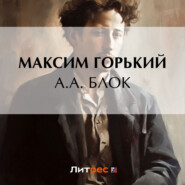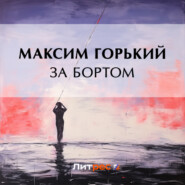По всем вопросам обращайтесь на: info@litportal.ru
(©) 2003-2025.
✖
Mother
Настройки чтения
Размер шрифта
Высота строк
Поля
Next to Vlasova sat a little old woman with a wrinkled face, but youthful eyes. She kept her thin neck turned to listen to the conversation, and looked about on all sides with a strange expression of eagerness in her face.
"Whom have you here?" Vlasova asked softly.
"A son, a student," answered the old woman in a loud, brusque voice. "And you?"
"A son, also. A workingman."
"What's the name?"
"Vlasov."
"Never heard of him. How long has he been in prison?"
"Seven weeks."
"And mine has been in for ten months," said the old woman, with a strange note of pride in her voice which did not escape the notice of the mother.
A tall lady dressed in black, with a thin, pale face, said lingeringly:
"They'll soon put all the decent people in prison. They can't endure them, they loathe them!"
"Yes, yes!" said the little old bald man, speaking rapidly. "All patience is disappearing. Everybody is excited; everybody is clamoring, and prices are mounting higher and higher. As a consequence the value of men is depreciating. And there is not a single, conciliatory voice heard, not one!"
"Perfectly true!" said the retired military man. "It's monstrous! What's wanted is a voice, a firm voice to cry, 'Silence!' Yes, that's what we want – a firm voice!"
The conversation became more general and animated. Everybody was in a hurry to give his opinion about life; but all spoke in a half-subdued voice, and the mother noticed a tone of hostility in all, which was new to her. At home they spoke differently, more intelligibly, more simply, and more loudly.
The fat warden with a square red beard called out her name, looked her over from head to foot, and telling her to follow him, walked off limping. She followed him, and felt like pushing him to make him go faster. Pavel stood in a small room, and on seeing his mother smiled and put out his hand to her. She grasped it, laughed, blinked swiftly, and at a loss for words merely asked softly:
"How are you? How are you?"
"Compose yourself, mother." Pavel pressed her hand.
"It's all right! It's all right!"
"Mother," said the warden, fetching a sigh, "suppose you move away from each other a bit. Let there be some distance between you." He yawned aloud.
Pavel asked the mother about her health and about home. She waited for some other questions, sought them in her son's eyes, but could not find them. He was calm as usual, although his face had grown paler, and his eyes seemed larger.
"Sasha sends you her regards," she said. Pavel's eyelids quivered and fell. His face became softer and brightened with a clear, open smile. A poignant bitterness smote the mother's heart.
"Will they let you out soon?" she inquired in a tone of sudden injury and agitation. "Why have they put you in prison? Those papers and pamphlets have appeared in the factory again, anyway."
Pavel's eyes flashed with delight.
"Have they? When? Many of them?"
"It is forbidden to talk about this subject!" the warden lazily announced. "You may talk only of family matters."
"And isn't this a family matter?" retorted the mother.
"I don't know. I only know it's forbidden. You may talk about his wash and underwear and food, but nothing else!" insisted the warden, his voice, however, expressing utter indifference.
"All right," said Pavel. "Keep to domestic affairs, mother. What are you doing?"
She answered boldly, seized with youthful ardor:
"I carry all this to the factory." She paused with a smile and continued: "Sour soup, gruel, all Marya's cookery, and other stuff."
Pavel understood. The muscles of his face quivered with restrained laughter. He ran his fingers through his hair and said in a tender tone, such as she had never heard him use:
"My own dear mother! That's good! It's good you've found something to do, so it isn't tedious for you. You don't feel lonesome, do you, mother?"
"When the leaflets appeared, they searched me, too," she said, not without a certain pride.
"Again on this subject!" said the warden in an offended tone. "I tell you it's forbidden, it's not allowed. They have deprived him of liberty so that he shouldn't know anything about it; and here you are with your news. You ought to know it's forbidden!"
"Well, leave it, mother," said Pavel. "Matvey Ivanovich is a good man. You mustn't do anything to provoke him. We get along together very well. It's by chance he's here to-day with us. Usually, it's the assistant superintendent who is present on such occasions. That's why Matvey Ivanovich is afraid you will say something you oughtn't to."
"Time's up!" announced the warden looking at his watch. "Take your leave!"
"Well, thank you," said Pavel. "Thank you, my darling mother! Don't worry now. They'll let me out soon."
He embraced her, pressed her warmly to his bosom, and kissed her. Touched by his endearments, and happy, she burst into tears.
"Now separate!" said the warden, and as he walked off with the mother he mumbled:
"Don't cry! They'll let him out; they'll let everybody out. It's too crowded here."
At home the mother told the Little Russian of her conversation with Pavel, and her face wore a broad smile.
"I told him! Yes, indeed! And cleverly, too. He understood!" and, heaving a melancholy sigh: "Oh, yes, he understood; otherwise he wouldn't have been so tender and affectionate. He has never been that way before."
"Oh, mother!" the Little Russian laughed. "No matter what other people may want, a mother always wants affection. You certainly have a heart plenty big enough for one man!"
"But those people! Just think, Andriusha!" she suddenly exclaimed, amazement in her tone. "How used they get to all this! Their children are taken away from them, are thrown into dungeons, and, mind you, it's as nothing to them! They come, sit about, wait, and talk. What do you think of that? If intelligent people are that way, if they can so easily get accustomed to a thing like that, then what's to be said about the common people?"
"That's natural," said the Little Russian with his usual smile. "The law after all is not so harsh toward them as toward us. And they need the law more than we do. So that when the law hits them on the head, although they cry out they do not cry very loud. Your own stick does not fall upon you so heavily. For them the laws are to some extent a protection, but for us they are only chains to keep us bound so we can't kick."
Three days afterwards in the evening, when the mother sat at the table knitting stockings and the Little Russian was reading to her from a book about the revolt of the Roman slaves, a loud knock was heard at the door. The Little Russian went to open it and admitted Vyesovshchikov with a bundle under his arm, his hat pushed back on his head, and mud up to his knees.
"I was passing by, and seeing a light in your house, I dropped in to ask you how you are. I've come straight from the prison."
He spoke in a strange voice. He seized Vlasov's hand and wrung it violently as he added: "Pavel sends you his regards." Irresolutely seating himself in a chair he scanned the room with his gloomy, suspicious look.
The mother was not fond of him. There was something in his angular, close-cropped head and in his small eyes that always scared her; but now she was glad to see him, and with a broad smile lighting her face she said in a tender, animated voice:
"How thin you've become! Say, Andriusha, let's dose him with tea."
"Whom have you here?" Vlasova asked softly.
"A son, a student," answered the old woman in a loud, brusque voice. "And you?"
"A son, also. A workingman."
"What's the name?"
"Vlasov."
"Never heard of him. How long has he been in prison?"
"Seven weeks."
"And mine has been in for ten months," said the old woman, with a strange note of pride in her voice which did not escape the notice of the mother.
A tall lady dressed in black, with a thin, pale face, said lingeringly:
"They'll soon put all the decent people in prison. They can't endure them, they loathe them!"
"Yes, yes!" said the little old bald man, speaking rapidly. "All patience is disappearing. Everybody is excited; everybody is clamoring, and prices are mounting higher and higher. As a consequence the value of men is depreciating. And there is not a single, conciliatory voice heard, not one!"
"Perfectly true!" said the retired military man. "It's monstrous! What's wanted is a voice, a firm voice to cry, 'Silence!' Yes, that's what we want – a firm voice!"
The conversation became more general and animated. Everybody was in a hurry to give his opinion about life; but all spoke in a half-subdued voice, and the mother noticed a tone of hostility in all, which was new to her. At home they spoke differently, more intelligibly, more simply, and more loudly.
The fat warden with a square red beard called out her name, looked her over from head to foot, and telling her to follow him, walked off limping. She followed him, and felt like pushing him to make him go faster. Pavel stood in a small room, and on seeing his mother smiled and put out his hand to her. She grasped it, laughed, blinked swiftly, and at a loss for words merely asked softly:
"How are you? How are you?"
"Compose yourself, mother." Pavel pressed her hand.
"It's all right! It's all right!"
"Mother," said the warden, fetching a sigh, "suppose you move away from each other a bit. Let there be some distance between you." He yawned aloud.
Pavel asked the mother about her health and about home. She waited for some other questions, sought them in her son's eyes, but could not find them. He was calm as usual, although his face had grown paler, and his eyes seemed larger.
"Sasha sends you her regards," she said. Pavel's eyelids quivered and fell. His face became softer and brightened with a clear, open smile. A poignant bitterness smote the mother's heart.
"Will they let you out soon?" she inquired in a tone of sudden injury and agitation. "Why have they put you in prison? Those papers and pamphlets have appeared in the factory again, anyway."
Pavel's eyes flashed with delight.
"Have they? When? Many of them?"
"It is forbidden to talk about this subject!" the warden lazily announced. "You may talk only of family matters."
"And isn't this a family matter?" retorted the mother.
"I don't know. I only know it's forbidden. You may talk about his wash and underwear and food, but nothing else!" insisted the warden, his voice, however, expressing utter indifference.
"All right," said Pavel. "Keep to domestic affairs, mother. What are you doing?"
She answered boldly, seized with youthful ardor:
"I carry all this to the factory." She paused with a smile and continued: "Sour soup, gruel, all Marya's cookery, and other stuff."
Pavel understood. The muscles of his face quivered with restrained laughter. He ran his fingers through his hair and said in a tender tone, such as she had never heard him use:
"My own dear mother! That's good! It's good you've found something to do, so it isn't tedious for you. You don't feel lonesome, do you, mother?"
"When the leaflets appeared, they searched me, too," she said, not without a certain pride.
"Again on this subject!" said the warden in an offended tone. "I tell you it's forbidden, it's not allowed. They have deprived him of liberty so that he shouldn't know anything about it; and here you are with your news. You ought to know it's forbidden!"
"Well, leave it, mother," said Pavel. "Matvey Ivanovich is a good man. You mustn't do anything to provoke him. We get along together very well. It's by chance he's here to-day with us. Usually, it's the assistant superintendent who is present on such occasions. That's why Matvey Ivanovich is afraid you will say something you oughtn't to."
"Time's up!" announced the warden looking at his watch. "Take your leave!"
"Well, thank you," said Pavel. "Thank you, my darling mother! Don't worry now. They'll let me out soon."
He embraced her, pressed her warmly to his bosom, and kissed her. Touched by his endearments, and happy, she burst into tears.
"Now separate!" said the warden, and as he walked off with the mother he mumbled:
"Don't cry! They'll let him out; they'll let everybody out. It's too crowded here."
At home the mother told the Little Russian of her conversation with Pavel, and her face wore a broad smile.
"I told him! Yes, indeed! And cleverly, too. He understood!" and, heaving a melancholy sigh: "Oh, yes, he understood; otherwise he wouldn't have been so tender and affectionate. He has never been that way before."
"Oh, mother!" the Little Russian laughed. "No matter what other people may want, a mother always wants affection. You certainly have a heart plenty big enough for one man!"
"But those people! Just think, Andriusha!" she suddenly exclaimed, amazement in her tone. "How used they get to all this! Their children are taken away from them, are thrown into dungeons, and, mind you, it's as nothing to them! They come, sit about, wait, and talk. What do you think of that? If intelligent people are that way, if they can so easily get accustomed to a thing like that, then what's to be said about the common people?"
"That's natural," said the Little Russian with his usual smile. "The law after all is not so harsh toward them as toward us. And they need the law more than we do. So that when the law hits them on the head, although they cry out they do not cry very loud. Your own stick does not fall upon you so heavily. For them the laws are to some extent a protection, but for us they are only chains to keep us bound so we can't kick."
Three days afterwards in the evening, when the mother sat at the table knitting stockings and the Little Russian was reading to her from a book about the revolt of the Roman slaves, a loud knock was heard at the door. The Little Russian went to open it and admitted Vyesovshchikov with a bundle under his arm, his hat pushed back on his head, and mud up to his knees.
"I was passing by, and seeing a light in your house, I dropped in to ask you how you are. I've come straight from the prison."
He spoke in a strange voice. He seized Vlasov's hand and wrung it violently as he added: "Pavel sends you his regards." Irresolutely seating himself in a chair he scanned the room with his gloomy, suspicious look.
The mother was not fond of him. There was something in his angular, close-cropped head and in his small eyes that always scared her; but now she was glad to see him, and with a broad smile lighting her face she said in a tender, animated voice:
"How thin you've become! Say, Andriusha, let's dose him with tea."

















